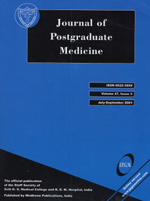
|
Journal of Postgraduate Medicine
Medknow Publications and Staff Society of Seth GS Medical College and KEM Hospital, Mumbai, India
ISSN: 0022-3859
EISSN: 0022-3859
Vol. 48, No. 4, 2002, pp. 260-265
|
 Bioline Code: jp02090
Bioline Code: jp02090
Full paper language: English
Document type: Research Article
Document available free of charge
|
|
|
Journal of Postgraduate Medicine, Vol. 48, No. 4, 2002, pp. 260-265
| en |
Effect of 12 Months of Recombinant Human Growth Hormone Replacement Therapy on Insulin Sensitivity in GH-Deficient Adults as Determined by Different Methods
Micic D, Cvijovic G, Doknic M, Kendereski A, Popovic V
Abstract
BACKGROUND: Controversial results have been obtained in measuring insulin sensitivity (SI) during recombinant human growth hormone (rhGH) treatment in adult growth hormone deficient (GH-deficient) patients. AIMS: The aim of our study was to estimate SI before and during treatment using three different methods for quantifying insulin sensitivity in GH-deficient adults treated with rhGH. SETTINGS AND DESIGN: Twenty-one GH-deficient adults were treated with rhGH during 12 months. SI was estimated using Minimal model analysis, Homeostatic Model of Assessment (HOMA) and Quantitative Insulin Sensitivity Check Index (QUICKI) before and after 3, 6, 9 and 12 months of rhGH therapy. PATIENTS AND METHODS: Oral Glucose Tolerance Test (OGTT) and Frequently Sampled Intravenous Glucose Tolerance Test (FSIGT) were performed in each patient at respective time intervals. QUICKI and HOMA were calculated using basal values of glucose and insulin from FSIGT. Minimal model computer analysis was calculated from glucose and insulin data obtained during FSIGT. STATISTICAL ANALYSIS: Area under the curve for glucose, insulin and C-peptide were calculated using trapezoidal rule from OGTT data. Differences and correlations were tested using ANOVA for repeated measures, Wilcoxon's matched-paired test, paired t-test, Pearson's correlation and Bland Altman plot. RESULTS: There were no significant changes in SI using Minimal model analysis and QUICKI during rhGH treatment. On the contrary, HOMA analysis indicated significant deterioration in SI after 12 months of therapy. CONCLUSION: Our study did not demonstrate any changes in SI using Minimal model and QUICKI analysis, while there was significant increase in insulin resistance using HOMA model. We suggest that the choice of method for the determination of SI may influence the interpretation of results concerning the effect of rhGH therapy on SI in GH-deficient adults.
Keywords
Insulin sensitivity, GH-deficient adults, rhGH treatment
|
| |
© Copyright 2002 Journal of Postgraduate Medicine. Online full text also at http://www.jpgmonline.com
Alternative site location: http://www.jpgmonline.com
|
|
